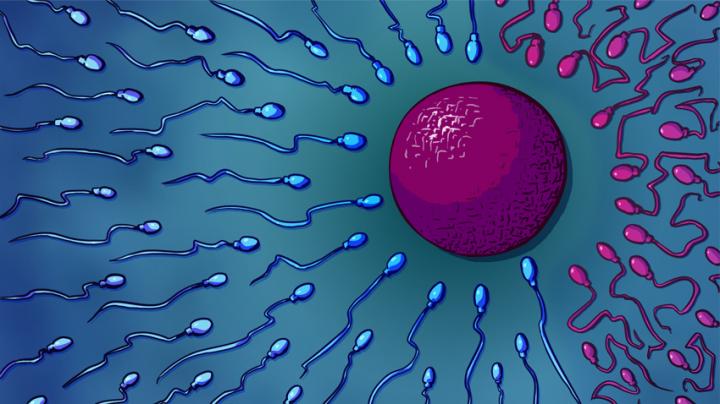Michigan Medicine researchers find genes that help maintain the 50-50 balance between male and female offspring

Credit: Leila Mullison, University of Michigan
Stamps School of Art and Design
One of the more recent trends among parents-to-be is the so-called gender reveal, a party complete with pink or blue cake to answer the burning question, “Is it a boy or girl?” After all, it’s presumed that there’s a 50-50 chance you’d have one or the other. In a new article published in Current Biology, Michigan Medicine researchers studying the sex chromosomes have discovered genes that, at least in mice, skew that assumed ratio to favor one sex and that could have major implications for male infertility.
“There are a handful of genes known to underlie male infertility but there’s still a lot unknown,” says Alyssa Kruger, a Ph.D. student within the Department of Human Genetics. Kruger, who works in the lab of principal investigator Jacob Mueller, Ph.D., and their colleagues have been studying the X and Y chromosomes — which are delivered by sperm to an egg to determine an offspring’s sex–across species and across millions of years of evolution.
Sex chromosomes are unique, Kruger explains, because while they were once an identical pair of chromosomes, they independently evolved distinct sets of genes. Upon examining mice sex chromosomes, they found two recently evolved X-linked gene families that are found only in mice. Interestingly, these genes are also present multiple copies. To figure out what the genes are responsible for, Kruger’s team removed them from the genomes of some mice using CRISPR and other technologies.
Removing all copies of one X-linked gene family produced mice whose offspring were biased towards being male by a ratio of 60-40. This discrepancy wasn’t a result of more Y-bearing sperm–the number of X and Y sperm remained the same in the mice. “This suggests to us that this gene is impacting the relative fitness of X versus Y sperm, but we don’t know how. Maybe the Y-bearing sperm are swimming faster or in a straighter line, we don’t yet know,” says Kruger.
Next, the team decided to increase the copy number of both X-linked gene families to get a better sense of why there are multiple copies. They duplicated these regions of the genome and surprisingly, this also skewed the sex ratio 60-40, only this time in favor of female offspring.
Kruger says that these X-linked gene families appear to be a “dial” for the fitness of X-bearing sperm. Interestingly, a related gene family on the Y-chromosome is also present in multiple copies and may serve an analogous role in Y-bearing sperm. The same sex-skewing has been observed in other experiments using fruit flies and, she says, something similar could be present in humans, though harder to observe. “We think of the back and forth copying of these genes as kind of an evolutionary arms race between the X and Y chromosomes that has played out over 20 million years to maintain the 50-50 male to female sex ratio.”
Beyond their sex-ratio effects, an important feature of the two genes is that their complete removal leads to male mouse infertility.
Specifically, removing all copies of both X-linked gene families prevented male mice from producing sperm; they were unable to transform round cells to the elongated cells with a head and tail we recognize as sperm. Says Kruger, “There are a lot of cellular processes that have to happen that aren’t. We hope this model will give us a better understanding of the developmental process of sperm production.”
###
Other than Kruger and Mueller, this work involved U-M researchers Michele A. Brogley, Jamie L. Huizinga, and Jeffrey M. Kidd, Ph.D.
Paper Cited: “A neofunctionalized X-linked ampliconic gene family is essential for male fertility and equal sex ratio in mice” Current Biology, 2019. DOI: 10.1016/j.cub.2019.08.057
Media Contact
Kelly Malcom
[email protected]
Original Source
https:/
Related Journal Article
http://dx.




